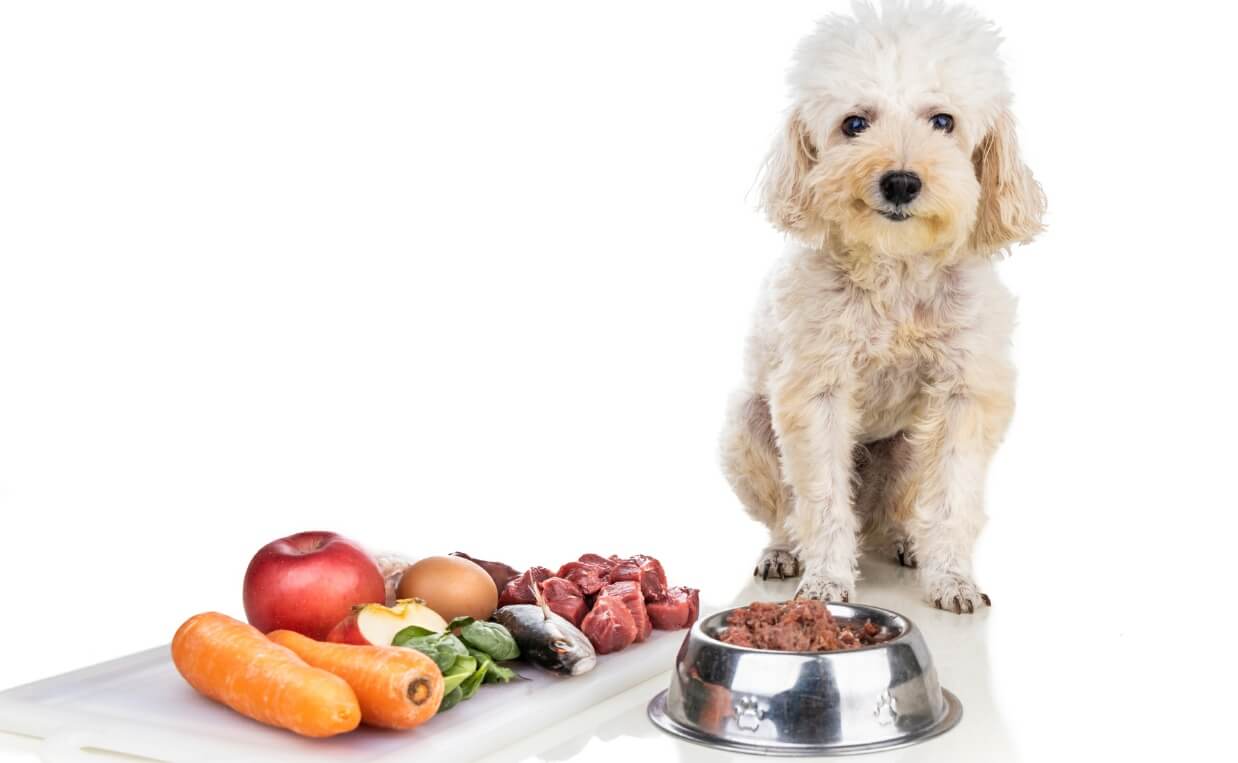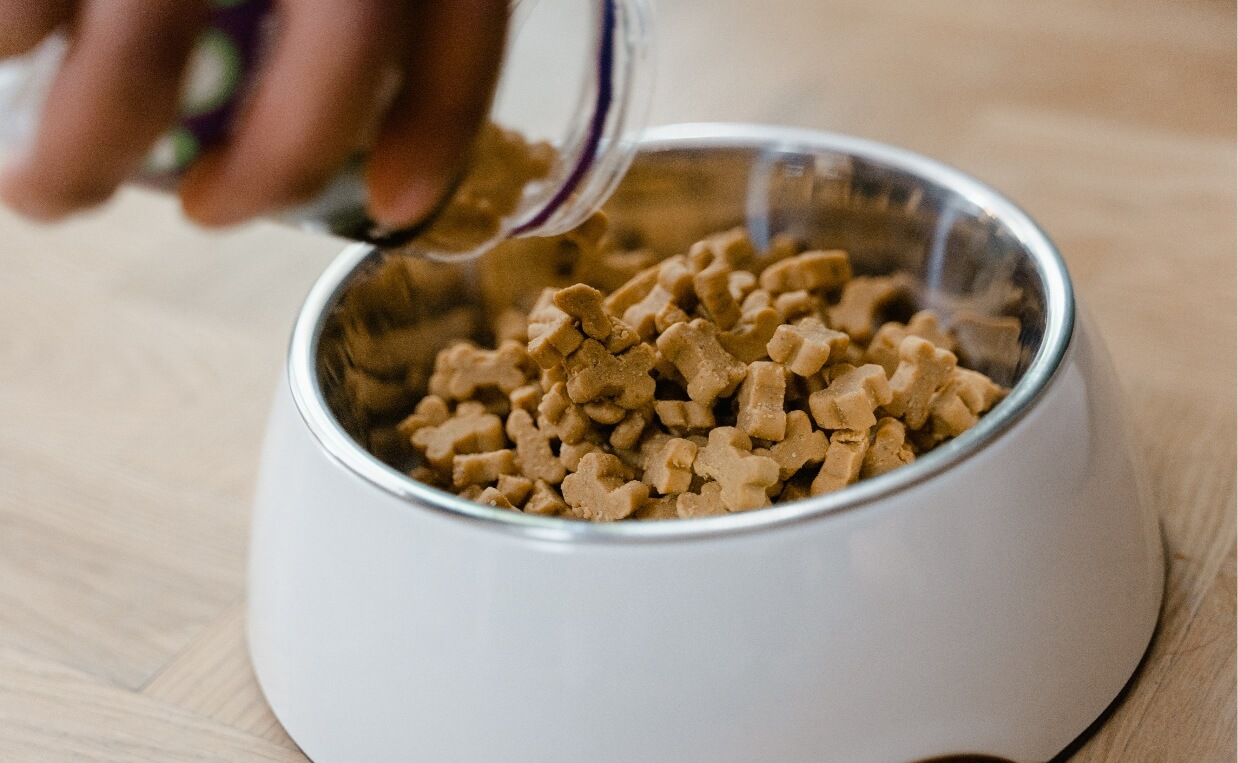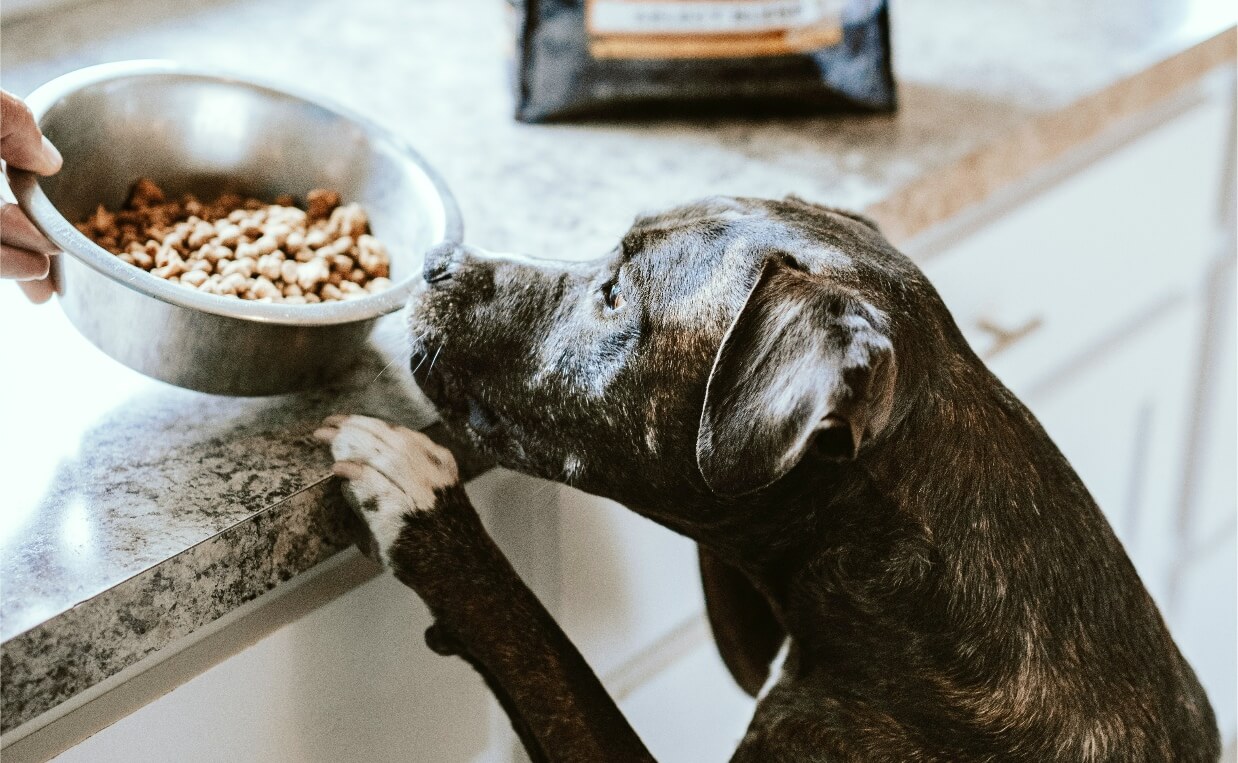
All dog parents want to give their dog the best nutrition possible. While store-bought kibble is convenient and relatively low priced (compared to canned or fresh diets), it does have nutritional shortfalls.
Today’s blog post covers 10 low cost, easy ways to make any dry dog food diet better.
*Note: Consult your dog’s veterinarian about adding any of these items to your dog’s diet if your dog has any health conditions or concerns.
Easy Ways to Improve Your Dog’s Kibble Diet
-
Raw eggs
Eggs are a great source of protein, iron, vitamin A, B12, and biotin, which support skin and coat health.
Most dogs have no trouble with bacteria in raw eggs, but it’s fine to feed soft-cooked, hard-cooked, or scrambled eggs as well.
Do not include the shell when you feed your dog eggs, as egg shells contain too much calcium for most dogs to handle. Calcium will also bind to other minerals in your dog’s food, making them less available to your dog. Furthermore, commercial eggs are sprayed with chemicals which can be damaging to your dog’s health.

-
Goat’s milk
Whether it’s yogurt, kefir or raw goat’s milk, it will provide great benefits for most dogs. Goat’s milk tends to be better tolerated by dogs than cow’s milk because it contains a lower level of lactose.
Raw goat’s milk has naturally occurring probiotics, which is enhanced once fermented and turned into kefir. These probiotics improve gut health and have been shown in animal studies to suppress allergies. In human studies, goat milk has been shown to reduce inflammation and lower cholesterol in animal studies.
Above all else, goat’s milk hydrates your dog’s food. Kibble is very dry and keeps your dog in a constant state of low dehydration.
However, goat’s milk is not good for all dogs. If your dog develops any negative side effects, such as loose stool, intestinal gas or diarrhea, goat’s milk is not suitable for your dog. Also, do not give your dog goat’s milk if he or she has a history of pancreatitis, obesity, or inflammatory conditions such as osteoarthritis, digestive disorders, autoimmune diseases, cancer or skin conditions.
-
Canned oily fish
Fish like sardines, anchovies, mackerel, herring and smelt are low in mercury and a great source of omega-3 fatty acids EPA and DHA that will improve skin and fur health in dogs. In addition, they help regulate the immune system and reduce inflammation, and so are helpful for dogs with allergies, arthritis and autoimmune diseases. DHA is also good for brain health, which can be especially beneficial for puppies and senior dogs.
Other canned fish options include jack mackerel and pink salmon, which are especially good for larger dogs.
Make sure you buy fish canned in water and not oil or sauce. The recommended dose of canned oily fish is 1 ounce per 35 lbs of weight and is usually fed 2-3 times per week. Start small and work your way up to prevent digestive issues.

-
Vegetables
Dark leafy greens like spinach, kale, Swiss chard and dandelion greens are a great addition to your dog’s diet as they are high in fiber, low in carbs, are high in phytonutrients and don’t contain any starch or sugar. Any fresh foods that contain fiber help bulk the stool which is especially good for dogs with anal gland issues.
Vegetables are best given to dogs steamed, pureed, or fermented to make these nutrients more bioavailable and easier to digest.
You don’t need to give your dog vegetables daily; you can rotate them with other fresh foods you’re adding to your dog’s diet.
-
Berries
Berries, like blueberries, strawberries, blackberries and cranberries are recommended for dogs because they are high in antioxidants, vitamins, and fiber. This is another addition that can be rotated with other additives throughout the week.

-
Coconut oil
Coconut oil contains MCT and can help with dry skin and immune system function. When selecting coconut oil for your dog, make sure it is unrefined and cold pressed.
Add coconut oil sparingly to your dog’s diet as it is high in saturated fat and lauric acid which can actually increase inflammation.
The recommended dose of coconut oil for dogs is 1 teaspoon per 10 lbs once a week or so. If you want to improve your dog’s skin and coat health, stick to canned oily fish (tip #3).
-
Green lipped mussel powder
If you can find fresh green lipped mussels, these are best. However, the powder still has some great benefits such as omega fatty acids and glucosamine which supports joints and ligaments.
-
Pumpkin
Pumpkin is a good source of fiber and potassium and is also commonly used to soothe digestive issues. If your dog needs a boost in fiber, you can feed him or her a few tablespoons per day. Just make sure you buy plain pureed pumpkin only, not pumpkin pie filling as it contains ingredients that aren’t good for dogs.
Read more: Healthy Easy Homemade Dog Treats (made with pumpkin puree)

-
Bone broth
Bone broth is super simple to make and is a great way to rehydrate your dog’s kibble. Bone broth promotes healthy gut function and it’s great for joint health since it’s packed with collagen, glucosamine, and chondroitin.
-
Freeze dried meat toppers
Freeze dried meat toppers have exploded in popularity over the last few years. These convenient packets contain gently freeze-dried foods such as chicken or beef, probiotics, blueberries, kale, carrots, etc. for additional nutrition.
Dog food toppers give your dog’s kibble a boost in nutrients at a fraction of the cost of raw diets.

Final Thoughts
If you’re like most pet parents and feed your dog kibble, many canine nutrition experts recommend bumping up your dog’s bowl with some fresh foods to replace nutrients lost during the high-heat processing. Consider including the above foods as healthy additions to your dog’s diet.
Wondering what foods you can – and can’t – feed your dog? Check out my Ultimate Guide to Foods You Can and Can’t Feed Your Dog
Do you use nutritional additives to improve your dog’s diet? What additives have you found to be helpful for your dog? Please share your experience in the comments below…

 5 Tips for Preventing Obesity in Your Dog
5 Tips for Preventing Obesity in Your Dog Can Dogs Eat Bell Peppers?
Can Dogs Eat Bell Peppers? Healthy Easy Homemade Dog Treats
Healthy Easy Homemade Dog Treats Understanding and Managing Dog Food Sensitivities
Understanding and Managing Dog Food Sensitivities Is It Safe for Dogs to Eat Human Food? What You Should Know
Is It Safe for Dogs to Eat Human Food? What You Should Know






Leave a Reply